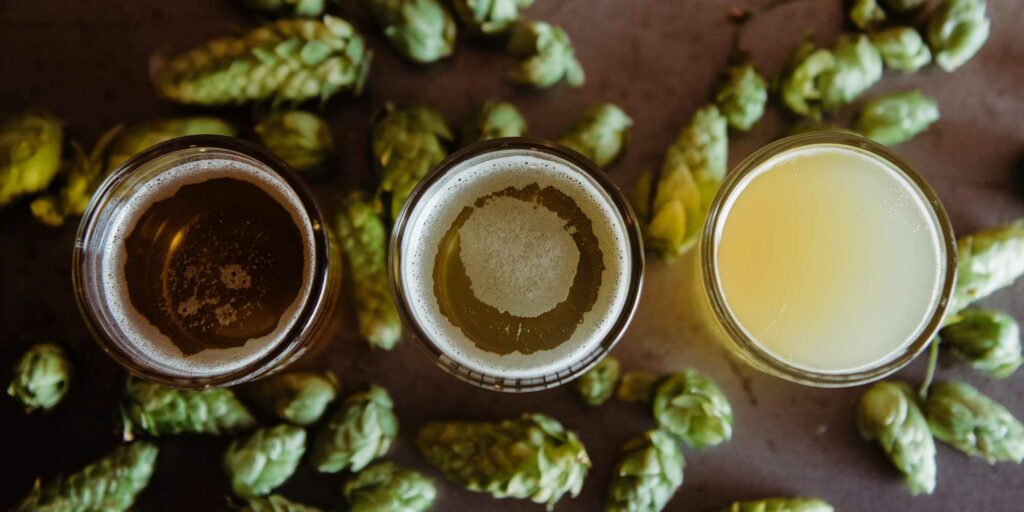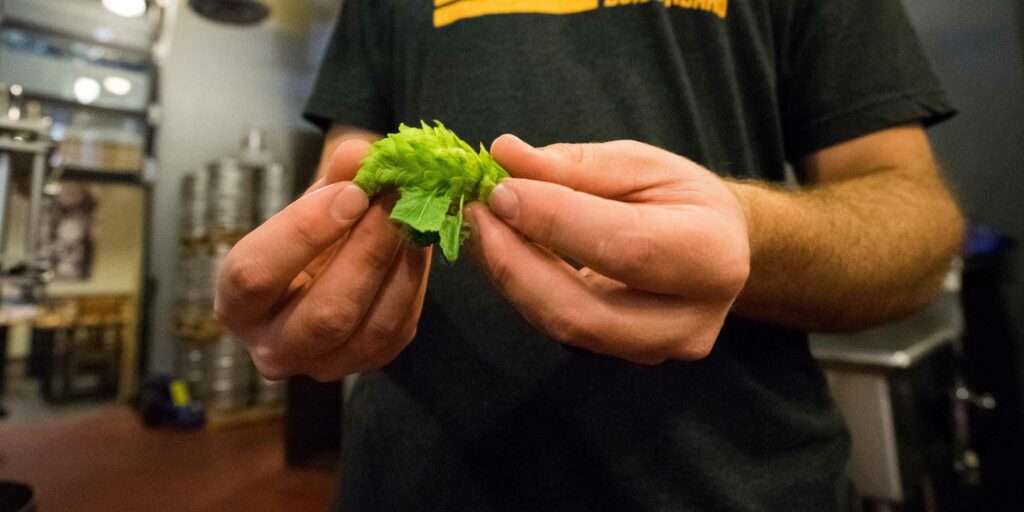
A question often asked, are hops essential for beer? Hops are the cornerstone of beer, and they’re not going anywhere. This may sound like an exaggeration, but it’s actually not far from the truth. Since the earliest days of brewing, hops have been a key ingredient in beer, adding flavour and bitterness to balance out the sweetness of malt, their other primary ingredient. However, some brewers are starting to buck this trend and question whether hops are necessary.
What are hops?
Hops are the cone-like flowers of the hop plant, which is a member of the Cannabaceae family (which also includes cannabis), Humulus lupulus. Named after the plant’s voracious nature (Lupulus means Wolf). If kept unchecked, the hop bines will “consume” trees and suffocate them. The plant’s female flowers (also called seed cones or strobiles) are used for beer brewing. Specifically, the lupulin; tiny deposits within the hop flower packed full of essential oils and alpha acid. Hops have been used in brewing beer for centuries and are responsible for imparting bitterness, flavour, and aroma to the finished product. The plant grows in many different regions across the globe. While many different varieties of hops are available, they all share certain common characteristics.
History of hops in beer
The first recorded use of hops in brewing was in the 9th century, though it is likely that they were used even earlier. For example, there are records of hop cultivation from around 600 AD in what is now Belgium. Early European beers would have been dark and cloudy from malt alone. It wasn’t until hops became popular in Europe about 800 years ago that their flavour could be enjoyed without an unpleasant bitterness from malt alone.
There is a beer style still around that do’nt use hops at all. its called Gruit, which relies on herps and spices to give flavour. This syle predates beers with hops in them.
What hops do in beer
They’re used in brewing beer for two main reasons: as a bittering agent and as a flavouring/aroma agent. When used for bittering, hops are added early in the brewing process to balance out the sweetness of the malt. When used for flavouring and aroma, hops are added later in the brewing process to give the beer its characteristic flavour and aroma. Some brewers also use dry hopping, which is when hops are added after fermentation has finished getting some of that hoppy goodness into the final product.

Bittering
Hops added at the start of the boil process contribute to the beer’s bitterness. If you want to calculate the bitterness, you need to look at the alpha acid of the hops variety and the length of boil time to calculate the IBU’s. IBU stands for International Bittering Units, and there are many online calculators that will help you work out the bittering units. The boiling process allows the bitterness to be released from the hops.
Flavour & Aroma
Hops added near the middle to end of the boil contribute more flavour and less bitterness. When added at the end of the boil, this contribute to the beer’s aroma. Hops can add fruit, spice, herb, mint, floral and even grassy flavours, to name a few. Many modern IPA recipes call for hops to be added at the Whirlpool stage at lower temperatures. We recently did a blog on how to do Whirlpool Hop Additions.
Preserving
Hops have preservative qualities, giving the beer longer shelf life. In fact, that’s why IPAs were invented. IPA stands for India pale ale. IPA was a solution to get beer to the British Empire in the east. India was too hot to brew in. What was needed was a beer that could survive a six-month trip from Britain. In the 1780s, a strong, heavily hopped beer called October ale did the trick. Adding more hops helped preserve the beer long enough for the long journey.
Head Retention
We all love that foamy head. Well, Hops contribute to head retention. The oils in hops coat the CO2 gas as they rise to the top. This coating stops the bubble from popping straight away.
In conclusion
With all that hops do in beer, can you really call a beer, a beer without them. Hops have also made new styles posable, adding unique flavours and aromas. Perhaps Gruit will make a comeback, or hybrids will be made. However, we think hops aren’t going anywhere.
Have a look at hops on our website:
Home-brewers – Purchase your hops online here
Commercial Brewers – Register for wholesale hop pricing here
Geterbrewed have loads of helpful hop video content on their youtube channel here